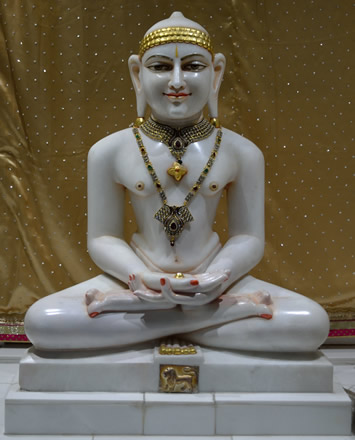Lord Mahavir

Bhagwan Mahavir is the twenty-fourth TEERTHANKAR of the present epoch of Jainism. He was born in 599 B.C. at Kshatriyaakund to King Siddharth and Queen Trishala. Mahavir was a contemporary of Bhagwan Buddha, the founder of Buddhism. His parents were followers of Bhagwan Parshvanath, the twenty-third TEERTHANKAR of Jains.
When Queen Trishala was expecting the baby, she had many beautiful dreams. She asked some scholars about the dreams. They said that she was going to have an extraordinary child, one who will show the path to true happiness to humanity. The child was given the name Vardhmaan which means one who brings prosperity.
There are many stories of Mahavir's boyhood. They illustrate that from early childhood, Mahavir believed in practicing non-violence. He did not use force to control even wild and dangerous animals. When people realized Vardhmaan's power of love, they gave him the name Mahavir, the Great Hero. Mahavir was sensitive to the pain and sufferings of humanity. So, he decided to leave home and become a monk. At the age of thirty, Mahavir gave up his worldly possessions including all means of comfort.
He learned to survive on small amounts of food and reduced his physical needs. He had no anger, pride or desires. He practiced non-violence, truth and celibacy. He performed severe penance and meditation for twelve years.
In this manner he rid his soul of four types of karma that obstruct proper perception and knowledge. Mahavir attained absolute knowledge (KEVAL JNAAN) and became omniscient. He became VEETARAAG, one who is beyond attachment and aversion. Mahavir attained the status of JIN, the victor, and of ARIHANT, one who is worthy of respect.
It should be noted that Mahavir did not start any new religion. He only revived the religion which was earlier preached by other TEERTHANKARS. Bhagwan Mahavir, like other TEERTHANKARS, reformed and modified the religious practices that were going on during his times. Bhagwan Mahavir emphasized that all events in the universe including those in the life of man take place according to laws of nature. There is no interference of any superhuman or supernatural beings in our lives. Thus performing any ritual to please GOD or demigods is futile. It is the purity of our feelings and thoughts that leads to spiritual progress. He renounced all rituals including those involving sacrifices of materials and animals. By scrupulously practicing the five vows, he showed the path to spiritual progress. He spent the last thirty years of his life in such spiritual pursuit.
At the age of seventy-two, in 527 B.C., Bhagwan Mahavir left the human body and attained salvation (NIRVANA) at Pavapuri in the state of Bihar in India. Since, then Pavapuri has become a place of pilgrimage for Jains.
